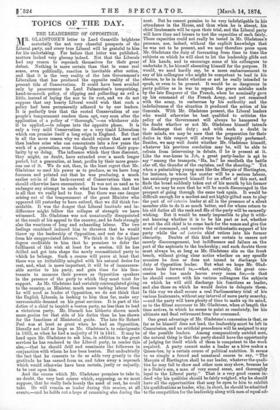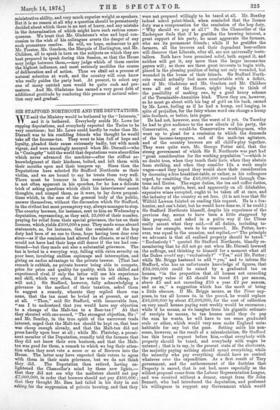TOPICS OF THE DAY.
THE LEADERSHIP OF OPPOSITION.
MR. GLADSTONE'S letter to Lord Granville brightens materially the not very cheerful prospects of the Liberal party, and every true Liberal will be grateful to him for his undertaking. For before that letter was published, matters looked very gloomy indeed. Not that the Liberals had any reason to reproach themselves for their great defeat. Nothing is more certain than that in some real sense, even politically, reaction is inevitable after action, and that it is the very reality of the late Government's Liberalism that has produced the opposite reality of the present tide of Conservatism. It could have been avoided only by perseverance in Lord Palmerston's temporising, hand-to-mouth policy, of clipping and pollarding an evil a little, instead of laying the axe to its root, and we do not suppose that any hearty Liberal would wish that such a policy had been permanently adhered to by our leaders. It is perfectly true that the rooted Conservatism of our people's temperament renders them apt, very soon after the application of a policy of "thorough,"—on whichever side it be applied,—to relapse into the opposite phase. It is only a very mild Conservatism or a very timid Liberalism which can promise itself a long reign in England. But that is all the more reason why we should rejoice that now and then leaders arise who can concentrate into a few years the work of a generation, even though they exhaust their popu- larity by so doing. The influence which they thus discount, they might, no doubt, have extended over a much longer period, but a generation, at least, profits by their more gener- ous use of it. We do not, then, in the least regret that Mr. Gladstone so used his power as to produce, as we have long foreseen and pointed out that he was producing, a much earlier set-in of the back-current of Conservatism than we should otherwise have encountered. It was not so used as to endanger any attempt to undo what has been done, and that is all that we really had to fear. But there was one danger arising out of the temperament of the great Minister who appeared till yesterday to have retired, that we did think for- midable. It was the danger that Liberal lassitude and in- difference might follow the collapse of strength we have witnessed. Mr. Gladstone was not unnaturally disappointed at the result of his appeal to the country, and he feels strongly also the weariness of long and exhausting labour. The two feelings combined induced him to threaten that he would throw up the leadership of Opposition, and rest for a time from his unappreciated labours. We think it in the highest degree creditable to him that he promises to defer the fulfilment of this wish at least for a session, till he has drilled and got into shape the newly reconstituted party to which he belongs. Such a course will prove at least that there was no irritability mingled with his natural desire for rest, and, what is more important, it will be of immeasure- able service to his party, and gain time for his lieu- tenants to measure their powers as Opposition speakers in the presence of the party to which they must trust for support. As Mr. Gladstone had certainly contemplated giving to the country, as Minister, much more tasking labour than he will need as leader of Opposition, we do not think that the English Liberals, in looking to him thus far, make any unreasonable demand on his great services. It is part of the duties of a chief to inspirit a beaten party, no less than to lead a victorious party. Mr. Disraeli has hitherto shown much more genius for that side of his duties than he has shown for the functions of Ministerial guide. The late Sir Robert Peel was at least as great when he had an Opposition, literally not half as large as Mr. Gladstone's, to reinvigorate in 1833, as when he had a majority of 91 in 1841. It may be hard upon Mr. Gladstone to ask him, in addition to the great services he has rendered to the Liberal party, to render this also,—that he should drill and reanimate the followers in conjunction with whom he has been beaten. But undoubtedly the fact that he consents to do so adds very greatly to the gratitude he has earned from us, and takes away a reproach which would otherwise have been certain, justly or unjustly, to be cast upon him. And the course which Mr. Gladstone promises to take is, no doubt, the very best course which, supposing, as we must suppose, that he really feels keenly the need of rest, he could take. He will remain as leader during this session, at all events,—and he holds out a hope of remaining also during the next. But he cannot promise to be very indefatigable in his attendance in the House, and thus when he is absent, his chief lieutenants will be upon their trial, and the Liberal party will have time and leisure to test the capacities of each fairly. Those capacities could not really be tested in Mr. Gladstone's presence, nor, indeed, without the explicit knowledge that he was not to be present, and we may therefore press upon Mr. Gladstone the duty of forecasting from time to time the subjects on which he will elect to let the leadership glide out of his hands, and to encourage some of his colleagues to. undertake it, he himself absenting himself for the purpose. It would, we need hardly say, be a mere embarrassment to any of his colleagues who might be competent to lead in his absence, to be in doubt whether or not he really intended to speak, or even to be present. It would be as dangerous in party politics as in war to repeat the grave mistake made by the late Emperor of the French, when he nominally gave up his command of the French Army, and yet remained with the army, to embarrass by his authority and the indefiniteness of the situation it produced the action of his Generals. With Mr. Gladstone present, the Liberal leaders who would otherwise be best qualified to criticise the policy of the Government will always be hampered by the doubt whether or not Mr. Gladstone himself intends to discharge that duty ; and with such a doubt in' their minds, we may be sure that the preparation for their duties in this respect will always be languidly performed, Besides, we may well doubt whether Mr. Gladstone himself, whatever his previous resolution may be, will be able to refrain from intervening in debate, if he is present at it. Like the war-horse in Job, a great party-leader is apt to say "among the trumpets, 'Ha, ha!' he smelleth the battle- afar off, the thunder of the captains, and the shouting." Yet when a painstaking young man like the Marquis of Hartington, for instance, to whom the matter will be a serious labour, has anxiously prepared himself for an effort of this sort, an& finds the bread suddenly taken out of his mouth by his former chief, we may be sure that he will be much discouraged in the prospect of going through the same task again. It would be difficult enough for a modest and not highly gifted man to play- the part of ad interim leader at all in the presence of a silent member able to do it 80 much better, and for whose return to. his old duties all the rank and file of the party will be earnestly- wishing. But it would be nearly impossible to play it with- out knowing whether it is to be his part or not, whether- or not the old chief is to come back for the nonce and give the word of command, and receive the enthusiastic support of his' party while the ad interim chief retires into his former obscurity. Doubts of this kind are certain to ensure not merely discouragement, but indifference and failure on the part of the aspirants to the leadership ; and such doubts there must always be, so long as Mr. Gladstone sits on the front bench, without giving clear notice whether on any specific occasion he does or does not intend to discharge his duty of Opposition leader. But what we hope Mr. Glad- stone looks forward to,—what, certainly, the great con- cession he has made leaves every room for,—is that he should concert with his various colleagues the subjects on which he will still discharge his functions as leader,. and also those on which he would desire to delegate them. In this way we shall secure a real Parliamentary trial of his various lieutenants, without any interval of mere party anarchy, —and the party will have plenty of time to make up its mind, as to the fittest successor to Mr. Gladstone, when at length the time arrives, to which he seems to point so resolutely, for his ultimate and final retirement from the command.
One great advantage of Mr. Gladstone's concession is that, so far as he himself does not lead, the leadership must be left in Commission, and no artificial precedence will be assigned to any of the possible leaders. Among comparatively untried men,. the natural thing is that the party should have the opportunity of judging for itself which of them is competent to the work required. A party cannot make a leader as a hive makes a Queen-bee, by a certain course of political nutrition. It seems to us simply a forced and unnatural course to say, "The Marquis of Hartington shall be our leader, whatever the quali- ties he may fail to show and other men may show, because he is a Duke's son, a man of very sound sense, and thoroughly loyal to the Liberal party." That is a very good reason in- deed why his qualities should be fairly weighed, why he should have all the opportunities that may be open to him to exhibit his qualifications as leader, why, in short, he should be admitted to the competition for the leadership along with men of equal ad- Bat it is no reason at all why a question should be prematurely decided about which there is no sort of hurry, and any mistake in the determination of which might have such serious conse- quences. We trust that Mr. Gladstone's wise and loyal con- cession to the wish of his colleagues averts the danger of any such premature resolve. He will, we hope, endeavour to get Mr. Forster, Mr. Goschen, the Marquis of Hartington, and Mr. Childers, all to speak in turn on the subjects on which they are best prepared to speak during this Session, so that the House may judge between them,—may judge which of them carries the highest influence, and most seriously modifies the course of deliberation and of action. Thus we shall set a process of natural selection at work, and the country will soon know who really guides the party best. At present, to select any one of many untried men would be quite rash and pre- mature. And Mr. Gladstone has earned a very great debt of additional gratitude by rendering this process of natural selec- tion easy and gradual.

































 Previous page
Previous page